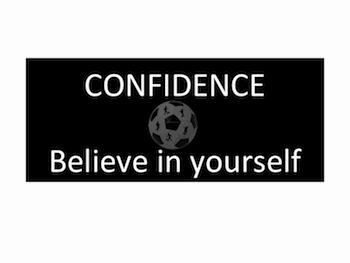Confidence is a feeling and one that you cannot buy, wish or hope for. It comes from demonstrated skill, practice and previous success. The more confidence you have the more you will relax, focus and trust yourself in pressurised moments.
Playing with confidence gives you the best chance to succeed and this will help you to reach your true potential and really that is all a player can ask of his or her self.
Low Confidence
People with low confidence generally are afraid of doing things that competition might require you to do. This will cause a player to be nervous, take very few risks and make mistakes. They will need enthusiasm from others to keep going. The value what others think and say of them which makes them fragile and overly sensitive.
“In order to be a successful competitor you have to care”
At the opposite end of this we have over confident which sometimes is actually fake confidence. Can be seen as bragging, taunting, drawing attention to themselves, being disrespectful and arrogant. These are generally a cover up for a lack or real inner strength.
We have all witnessed the player who is so arrogant he/she depends on talking his/her game up when it starts to drop. When the arrogant player isn’t successful they blame the Coach, the manager, his/her teammates, the position or task, officials and anything else they can think of but themselves.
Inner Confidence
The very best players, those with inner confidence don’t have to tell people how good they are they know they are good because of all the hard work they put in before they walk onto that pitch. That quiet confidence and an inner belief is the sign of a fully prepared competitor.
Yet many players who come fully prepared can also get very nervous before performing. This can have an impact on them mentally and physically. The key here is to know what is making them feel this way and how to get over it.
FEAR = False Evidence Appearing Real
Fear of Failure
Feeling the fear of success or fear of failure is not abnormal by any means; it comes with the territory. Every athlete feels fear of failure at one time or another. Is the single biggest obstacle in a players way to success and reaching their true potential is the fear of failure. Failure damages mindset and makes them not trust themselves. It can lead to tension and can kill performance. The more we fear the more we fail. The more they fear making mistakes the more mistakes they make. The way around this is to control and alter ones mindset.
Mistakes
So we know that the best way to learn is to make mistakes. Every game we play comes with mistakes the key is to embrace them and learn from them. However that’s easier said than done. After all it takes a very strong mindset to go from mistake to mistake and not let it affect the performance.
If you fear failure enough you will surely fail.
Confident players have learned that they never really fail. Mistakes are just something that allows them to learn, make them stronger and more prepared and focused for the next time. They realise that mistakes are part of the process and the more they can take on the quicker they will reach their goals. The best way to overcome fear is to take action.
Fear of Injury
The fear of injury is very common amongst young players. If a player is thinking this way they will take fewer risks and don’t put themselves about on the pitch physically. They will get involved in fewer challenges and be not be as aggressive as the more confident player. The less risks you take the less success you will have on the field.
“Practice is 90% physical and 10% mental. Competition is 10% physical and 90% mental” – Mark Spitz – Olympic Gold Medalist
Fear of what others think
Many players are more concerned with what others think and say about them than what they think about themselves. This is a true sign of a lack of confidence and again makes them nervous, under perform and lacking 100% focus.
The confident athlete doesn’t let what others think or say affect their confidence. They have made a conscious decision about this. They are comfortable with who they are and know that the only thing that matters is that they have done their best to perform well. They are able to assess their performance by their own standards and nobody else’s. They don’t focus on the result but instead focus on their effort. The scoreboard (a source of feedback) is there but will not reflect on their performance or who they are.
“One day of hard work is like one day of clean living, it isn’t going to make any difference” – Abe Lemons
Dealing with it
The most successful players admit to having overcome their fears. It is normal to be worried (I sit here typing this worrying about things but I try and push myself to overcome the fear of failing). Those players didn’t give into their fears, they faced them head on and took charge of it. By being in charge you will stop making excuses and be honest with yourself. The fist step to overcoming your fears becoming a confident player is to admit it and then identify what’s worrying you. Worries will hold you back until you ‘say’ what they are. Write them down and face them head on. Determination defeats fear every time.
I always tell the players to keep a diary. Write down what went well and what didn’t go so well. Write down how they felt before, during and after the game. How many actually do this is your guess!! I’m guessing not very many.
Questions they can ask like; Were you able to talk yourself up? What made you play with confidence or what made you play without confidence? How was your level of fitness? Did you make many mistakes? Were you mentally fatigued or physically fatigued? Did food or hydration have an impact?
The answer to these questions whether they played good or bad will help the player make corrections quickly and they’ll be on the way to becoming a more confident all-round performer.
Fear of Success
Why do teams and players fail when the pressure gets to them?
Often this happens because of high expectations put on them by adults, coaches and others. Success can’t always be repeated and some players have been known to fear it as they don’t want the increased pressure and attention that winning brings (hard to believe, I know) so they let negatives thoughts enter their head and talk themselves down. It’s about confidence and believing in yourself and your skills as an athlete.
What happens, however when one feels afraid to succeed? When you fail at a task you just try and figure out what went wrong, and then put a strategy together and then go make it right. But for the timid and shy athlete success is a whole different can of worms. Success can be intimidating, tough to handle, involves more challenges, responsibilities, and is sometimes threatening. It’s the exposure that often causes the athlete to fear the success.
John R. Ellsworth – A Master Mental Games Coach has come up with 5 ways to overcome fear of success:
- Ask yourself, “Why am I killing my own success?” Check in with yourself and if you have a journal take time to put your thoughts down in your journal. What is it that’s holding you back? A sports psychologist or mental game coach is an excellent resource that brings the skills to help you get to the “What, When, and Why” behind the fear. Keep it simple. There is no need to figure it out, but just accepting or coming face to face with the fear is an excellent beginning.
- Preparation, Prepares for Peak Performance. If you are procrastinating or wait to the last minute to get things done it could be that you are a perfectionist, have an attention deficit challenge, or you subconsciously or deliberately do things to limit success like partying, or being late to practice, or simply not working on skills. Practice is safe for the fear of success athlete, but when the time comes to actually perform is when the subconscious avoidance program starts to kick in.
- To have success you must first fail. I worked with a world class Olympic track and field sprinter that had a fear of success. He had gone through a dry spell where he was not getting the results he was expected to get. He started doubting himself and started to fear what was expected of him. The fear became so intense that he often failed, because he wasn’t sure what to do with his success once he got it. Once he figured out his fear of success was the hurdle he had to overcome he welcomed the prospect of success by planning what to do with it once it came.
- You are #1. So much of the fear of success or failure has to do with the “others” in your life. The others are people you feel you need to please to feel good or be recognized as a true champion. I’m here to tell you, it’s not about them, but is totally about you and trusting in yourself. If you focus on you it narrows the focus to the things you can control.
- Become multidimensional. Accept yourself as someone that has a diverse array of skills. As an athlete you may be a sprinter, but that does not mean you aren’t capable of mastering another skill or event. Just because you are poor at math doesn’t mean you can’t be a math teacher. See yourself in the world as a collection of talents rather than build your self-esteem around one aspect of who you are.
John says “to solve the fear of success dilemma he asks the athlete to imagine what it’s feels like to succeed void of the attention, and the notoriety. Write down on paper or in your journal what imagined success feels like without any judgement. Create as vivid a picture as possible using all the five senses”.
He goes on to say, “creating what it feels like to have success on your own terms empowers the athlete to see success without stress and avoids predicting an imagined unpleasant future. Planning in advance how you would like success to look and feel places all the cards in your hands and empowers you to accept success on your terms. This can be a very powerful tool in helping the athlete manage the feelings that come with being successful”.
Conclude
Ultimately it’s down to attitude. Attitude is a choice. Unlike skill, speed and strength attitude can be changed quickly. Players can go from a low confidence performer to having a growth mindset (competitors mindset) in a very short time. It’s up to them, no one else.
I’ll end with this quote:
“There is a choice you make in everything you do and you must always keep in mind, the choice you make, makes you”
Recommended books by Dan Abrahams Soccer Brain for the Coach and Soccer Tough for the Player
Ref: Psychology today, Protexsports
– End
I always like to hear your opinions. Please comment below or email me info@thecoachdiary.com, if you don’t have anything to add then please forward this on to a friend.
Thanks for reading. I’m also on twitter @Coachdiary






